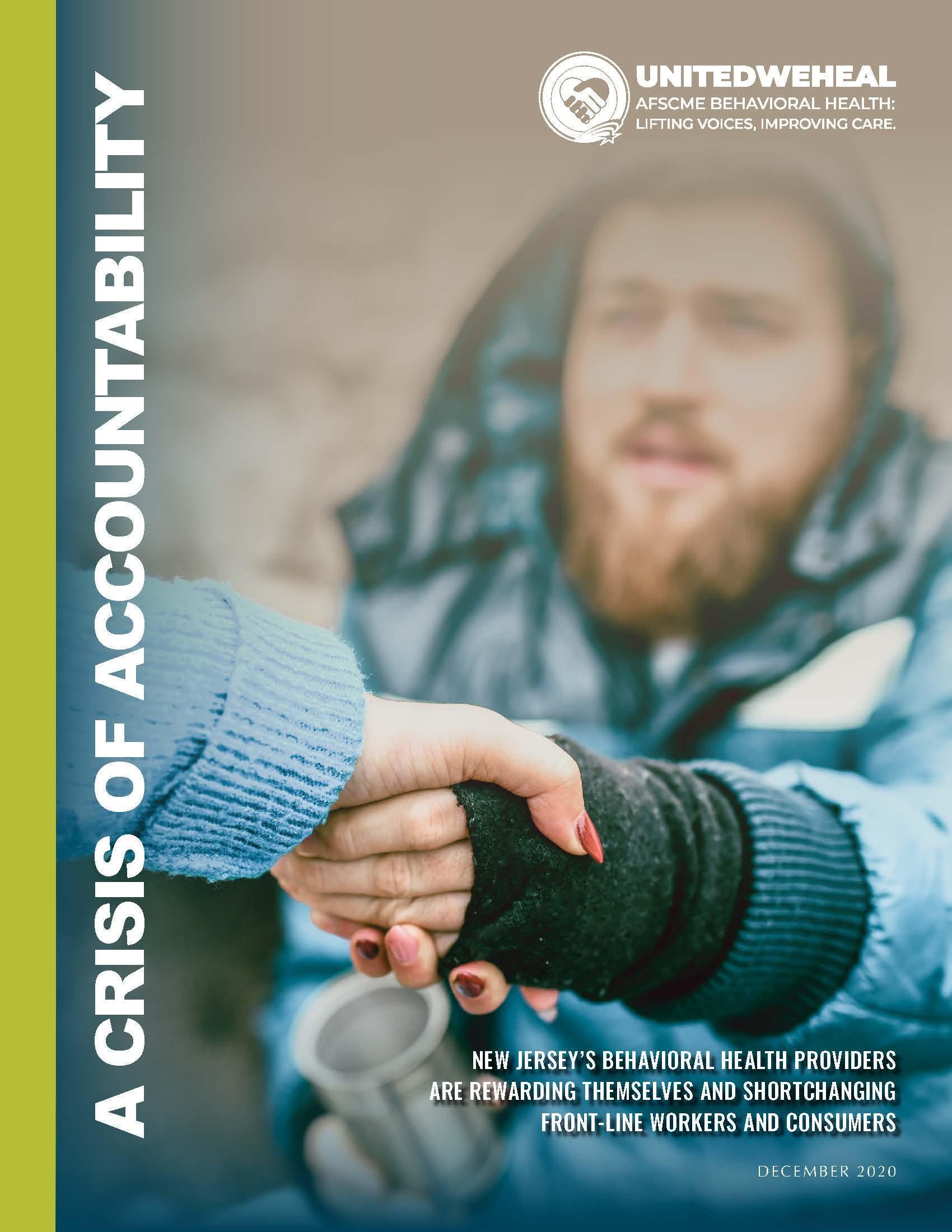New Report Details Broken Promises of New Jersey Behavioral Health Providers
Report Comes on the Heels of Important Legislation Protecting Workers’ Rights and Improving Standards for Consumers
Hamilton – Today, a new report was released that exposes how New Jersey’s top behavioral health providers have thrived as a group, while leaving the state’s consumers and their own employees behind. The report was released by United We Heal, a national movement of behavioral health workers supported by the American Federation of State, County and Municipal Employees (AFSCME) With more than 50,000 members providing behavioral health and substance use disorder services, AFSCME is the largest behavioral health workers union in the country.
Key findings include:
- Provider agency finances have dramatically improved. Between 2014 and 2018, 87% of the leading providers had improved yearly financial performance.
- The CEOs are rewarding themselves. Between 2014 and 2018, spending on top executive compensation for New Jersey’s leading providers increased 28.7%, with the median executive pay being $223,581 per year and more than 20% of executives making over $300,000 per year.
- Providers bill the state for services that they never deliver to consumers. Despite a 2019 audit exposing such practices, providers continued to bill for services without ensuring consumers receive them.
- The actual staff responsible for providing services are falling behind. Per-employee spending on salaries and wages for program service staff increased by a mere 0.7%. For employers with 500 employees or more, per-employee spending on salaries actually decreased by 2.5%.
- Workers report instances of retaliated against when they have spoken up about safety or fraud concerns and of being cheated out of wages and benefits. One-third of New Jersey’s 30 leading behavioral health providers have been cited for wage and hour violations, worth hundreds of thousands of dollars, since 2010. Workers report having faced harsh retaliation for speaking up about the quality of consumer care, including unsafe staffing ratios, Medicaid fraud, neglect, abuse, dilapidated conditions, and the lack of adequate background checks.
The report comes shortly after the passage and signing of Senate Bill 2708, which was unanimously supported in the legislature. Senate Bill 2708 will raise contracting standards for provider agencies contracted with the Division of Mental Health and Addiction Services (DMHAS) and the Department of Children & Families (DCF), protecting workers rights and ensuring that behavioral health workers and consumers are able to safely provide and receive care.
“This report makes clear why change is needed in the behavioral health industry in New Jersey,” said AFSCME Council 63 Executive Director Steven Tully. “Even after workers for SERV Behavioral Health in Mercer County voted overwhelmingly to form a union in December 2019, they still do not have a contact. That is because CEO Regina Widdows is more focused on trying to silence their voice than working together for the customers. Even while some workers have to work three jobs to make ends meet, her compensation went up 39% in just one year to $423,000 in 2019.”
“The reality is that you cannot fix the behavioral health crisis in New Jersey and provide better care for consumers and clients without giving the front-line workers who deliver those services a voice in how to accomplish it,” said NUHHCE District 1199J President Susan Cleary. “Providers have had years to improve the quality of care and stabilize the workforce, and the results, exposed in this report, speak for themselves.”
“When workers like myself have a voice, we can create a workplace environment that is inclusive and rewarding,” said Ratna Joshi-Nelson, a family coordinator at CarePlus NJ, Inc. and a member of NUHHCE District 1199J. “Here, I know my voice is respected, my views are welcome and I am a valued member of the CarePlus family.”
“I have experience working for both union and non-union providers and the differences couldn’t be clearer,” said Dana Lugassy, a psychiatric social worker at the George J. Otlowski, Sr. Center for Mental Health Care and member of AFSCME Council 63. “When I worked for SERV, it always felt like we were trying to make miracles happen because we never had that we needed to really get the job done. Now, I can speak up on behalf of my consumers so they get the care they need not just to survive, but to thrive.”
###

